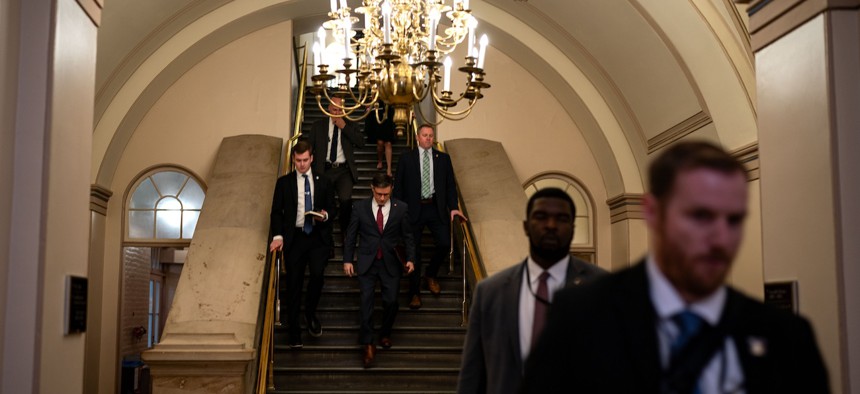
House Speaker Mike Johnson, R-La., arrives for a House Republican conference meeting on Capitol Hill on March 6. Fiscal year 2024 funding would be covered under a proposed six-bill spending package that was released on March 3. Kent Nishimura/Getty Images
2 days before a shutdown, House sends $460B spending package to Senate
The measure, which would require small spending cuts at many agencies, heads to the Senate.
The House on Wednesday approved a spending package in a 339-85 vote to set spending levels for some agencies for the rest of fiscal 2024, sending the measure to the Senate with just two days before a partial shutdown.
The $460 billion “minibus,” which contains funding for the departments of Agriculture, Energy, Housing and Urban Development, Transportation, Veterans Affairs, Interior, Commerce and Justice, as well as the Environmental Protection Agency and a few other agencies, won broad bipartisan support after months of delays and four stopgap bills to keep the government from closing its doors. The measures will force many agencies across government to absorb modest cuts relative to their current funding levels, though overall non-defense discretionary spending will remain flat.
The Senate is expected to quickly take up and pass the package before a partial shutdown would begin first thing Saturday morning. Appropriators will then face a March 22 deadline as they turn their attention to the second package featuring six of the 12 annual spending bills Congress must pass each year.
House Speaker Mike Johnson, R-La., ahead of the vote on Wednesday touted that Republicans successfully won “cuts to some of the agencies that we believe are really overreaching.” Those include EPA, FBI and Bureau of Alcohol, Tobacco, Firearms and Explosives, though after accounting for one-off projects in fiscal 2023 and supplemental funding through previously passed laws the reductions are not as significant as initially advertised. House Republicans have noted they did not include increased spending for federal employee salaries for the current fiscal year, despite President Biden authorizing a 5.2% pay bump that went into effect Jan. 1. That will require agencies to absorb those personnel costs elsewhere in their budgets, they said.
Democrats boasted that they staved off the larger cuts Republicans had sought and secured funding for key priorities, including hiring air traffic controllers at the Federal Aviation Administration and mental health care professionals at the Veterans Affairs Department.
“We successfully defeated the vast majority of the extreme cuts and hundreds of harmful policy riders proposed by the House Republicans,” House Appropriations Committee Ranking Member Rosa DeLauro, D-Conn., said on Wednesday. “We rejected their attempts to defund critical agencies and programs and we rejected their culture war riders.”
The White House on Tuesday called for “swift passage” of the spending package, saying it would advance a “range of key national priorities.”
The measure “sustains critical infrastructure programs, maintains pay raises for federal wildland firefighters, and fully funds veterans’ medical care,” it said.
The Senate may have to contend with some members who will make demands before giving their approval for expedited consideration of the bill, though Majority Leader Chuck Schumer, D-N.Y., expressed confidence his chamber would move in time.
“As soon as the House passes these appropriations bills and sends them to the Senate, I will put the bills on the floor so we can pass them and fund these six departments with time to spare before Friday’s deadline,” Schumer said on Wednesday.
DeLauro said she was hopeful appropriators would meet the deadline for the second minibus, which will include potentially thornier parts of the government such as the Homeland Security Department.
“We are on target and on track to meet that deadline of March 22,” DeLauro said. “We are not going to be shutting government down.”
Schumer was similarly optimistic, though he cautioned partisan differences could still derail progress.
“Passing these bills will give us much-needed momentum to finish the next package of spending bills by the March 22 deadline,” Schumer said. “But as I’ve said repeatedly, it will take bipartisan cooperation to finish the job.”
Congressional leaders previously agreed to a top-line spending level of $1.66 trillion for fiscal 2024. Overall, defense spending is set to jump 3% to $886 billion and non-defense spending will stay essentially flat relative to fiscal 2023 at nearly $773 billion.







